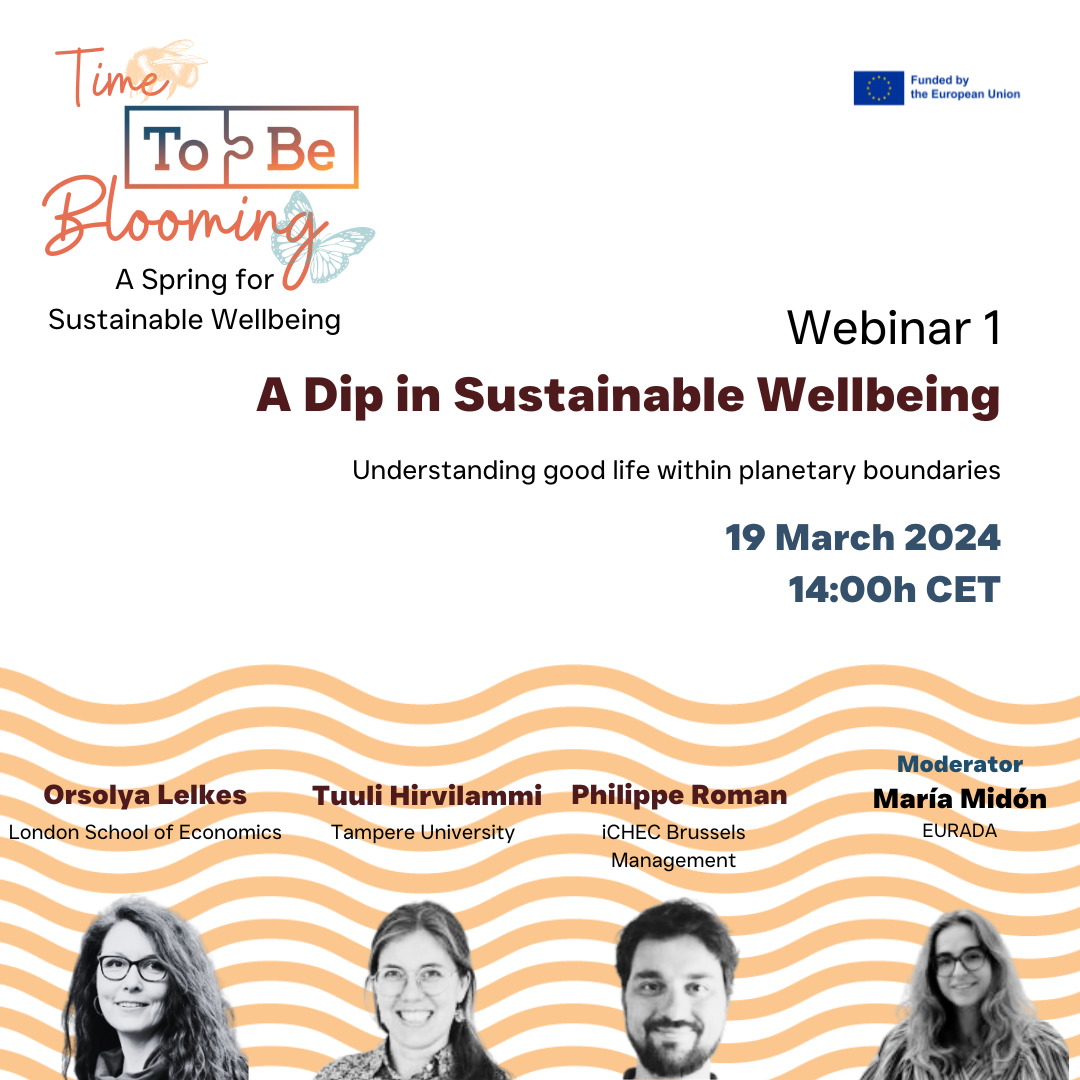Building on this premise, and in order to bring this discussion to a wider audience, the ToBe Research project has developed the “Time ToBe Blooming: A Spring for Sustainable Wellbeing” webinar series. Offering a comprehensive exploration of sustainable wellbeing, this series delves into its main notions, the broader EU policy landscape and addresses local approaches to wellbeing economies.
The first webinar, held on 19 March 2024 and entitled “A Dip in Sustainable Wellbeing: Understanding good life within planetary boundaries”, tackled the core concepts of sustainable wellbeing, laying the groundwork for discussions to be built on a common understanding.
First, Tuuli Hirvilammi opened the session introducing the ToBe Research project and gave an insightful presentation emphasising that, in a path towards sustainable wellbeing, it becomes essential to understand that, as human beings, we are embedded in a biophysical foundation and, as such, we exist in and as part of nature, not as isolated creatures. This is particularly relevant considering that the mainstream macroeconomic model and the welfare state focus on the social aspects of human wellbeing when it comes to policymaking but ignore the biophysical foundation in which we are embedded.
Sustainable wellbeing and post-growth macroeconomic modelling must therefore recognise the inherent nature of biophysical elements in addressing human sustainable wellbeing. As Hirvilammi puts it, "when we understand that the biophysical foundation is key, we understand that by hampering it, we are preventing future generations from the opportunity to thrive."
Moreover, Hirvilammi addressed the notion of sufficiency which, seen as the confluence of post-growth streams, implies that wellbeing is found where human needs are met within the viability of the biosphere. Drawing from this line of thought, Orsolya Lelkes stated that sufficiency “is an invitation to connect to the deepest needs […] as individuals, but also as a collective to become more resilient… Doing what is good for us and also questioning many of the cultural norms by mainstream economics and the myth that mass consumption creates happiness; there is evidence in empirical psychology that individuals who have high-consumption lifestyles tend to have lower wellbeing”. Introducing the concepts of sustainable hedonism and a flourishing life, she argued that, contrary to popular opinion, opting for "minimalism in a world of maximisers" or for an ecologically responsible behaviour does not result in loss of happiness and quality of life, but quite the opposite.
The last intervention was that of Philippe Roman, bringing to the debate his perspective as an ecological economist, raised the question of how sustainable wellbeing could shape the not only the economy but also economics. He expressed that in order to be at the service of sustainable wellbeing, “economics and the economy should change its normativity, its purpose, its goal”. In this regard, he mentioned that most economic literature addresses “economics of”, but hardly “economics for”. Acknowledging the need to change this approach, he stressed that it is essential to “rethink both the ontology, the epistemology, but also the normativity of economics to think in this direction”.
In order to conclude, the first webinar of the “Time ToBe Blooming” series provided profound insights into the foundational principles and practical implications of sustainable wellbeing. It underscored the interconnectedness of happiness, environmental sustainability, sufficiency, economy, and policymaking. While recognising the need for individual lifestyle adjustments, the (urgently needed) paradigm shift cannot be left in the hands of individuals or private entities. As Hirvilammi contends, structural change and transformative policies require thorough planning and collective action. As we navigate the complexities of the modern world, these spaces of dialogue serve as a compass towards a more just, resilient, and flourishing society within planetary boundaries.
If you missed the session and are interested in getting more insights from the discussion, you may watch the recording here.
We invite you to register here to the next webinar on23 April 2024 (14:00-15:30h CEST), where we will delve into the EU Green Deal and upcoming elections.
